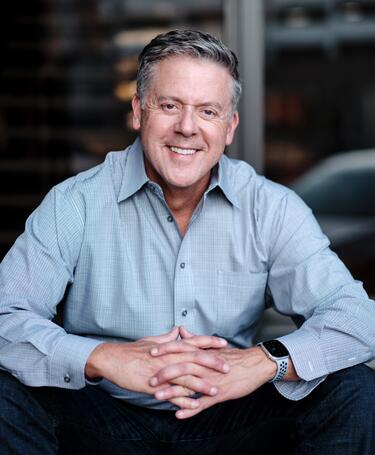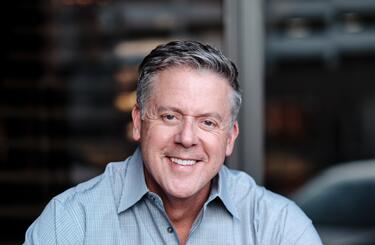
In conversation with Steve Cadigan
Progress indicator

We talked to HR strategist Steve Cadigan about how best to cope with the rapid changes that organisations are seeing right now.
In the ever-evolving landscape of the modern workplace, few possess the insight and experience of Steve Cadigan – a pre-eminent talent strategist and company culture expert. With an illustrious career spanning more than three decades, Cadigan has been pivotal in crafting the teams and cultures of some of the world’s most prestigious organisations, including Twitter, Eventbrite, Cisco and Intel. As LinkedIn’s chief human resources officer, he famously escalated the organisation’s talent roster from 400 to a staggering 4,000 in under four years, all the while curating its now-legendary corporate culture.
In this exclusive interview, we probe Cadigan's understanding of the dynamics of talent acquisition and company ethos in an age marked by disruption and rapid change. We started by asking him about some of the findings of our Workforce Insights research.
In our research, we found that a common barrier to career progression is the perceived importance of industry experience, which, in a way, is connected to the skills gap. What can organisations do to change that perception?
Let’s say that I want to hire someone for my firm. I want someone with industry experience who needs little training, because I want them to make an impact right away, right? If a candidate has worked in my sector before, it lowers my risk of hiring the ‘wrong person’.
And that's a great objective – there’s nothing wrong with it. However, if you step back and think about the pace of change happening in your industry: whatever skills and experiences you have, their relevance is changing faster than ever before.
So, is having industry experience still important when industries are changing so quickly? Is that experience bringing the same value to a job as it used to? I would argue it’s not.
Yes, I want to know that someone can do this work well, but more important is my confidence they can learn new things quickly, because my industry is going through change.
The best example of this in practice is in the automobile industry where the company that’s worth more than any other is the newest to the sector – Tesla. It doesn’t sell more cars than its competitors, nor does it make more profit, but it is worth more in terms of share price than Ford, Honda, Toyota, and General Motors put together. Why? Because investors believe Tesla can change faster than other automotive companies.
So, going back to your question about the skills gap: people who might not have direct industry experience often do have the ability to look at things from new perspectives, unencumbered by existing paradigms.
Industry experience is less valuable than it used to be, and that’s going to continue for the foreseeable future.
It’s said that, owing to an ageing population, we now have five generations in the workplace. For employers, what considerations should be made to manage this?
We are indeed living longer and – in many countries – the retirement age is being raised so people will have to work longer before they can start claiming benefits and pensions.
My advice is no different to that I’d have given 20 or 30 years ago, which is to always have different generations in your workforce. And we always need to recognise that the generations after us see the world differently. That is nothing new, but continuing to recognise it is important.
Look for common objectives and common goals, such as a desire to learn or make an impact.
My biggest concern about generational difference is that people look at it as a problem, but it’s not – it’s an asset for greater innovation and greater creativity.
What else can be done to increase diversity in organisations?
The most important thing is greater transparency: building a culture of trust and an environment where people believe that leadership has their best interests at heart. It’s important to share the reasons behind decisions and create opportunities for people to ask questions.
A lot of leaders are failing to see that the pace of change of business is faster right now than it's ever been, and sometimes we're so focused on the result that we forget to make sure that the team is with us. The team needs to understand why you’re taking the decisions that you’re taking.
How can organisations ensure they have EDI at the heart of their strategy?
It’s a sad truth, but I cannot recall working with any organisation that has made a significant difference to its diversity. We're giving more talk to this topic than action. It’s a much more complex problem than we think it is.
We all have various forms of bias, wherever we're from and however we were raised. The way I talk about this with the leaders is: if diversity truly is important to you, then you need to incorporate this into every day and every decision.
It’s not just about recruiting either – it's about who you involve with projects, who’s on your board, the diversity of your leadership team, and your employee population. If this really matters to you, you're going to need to invest some time. I see a lot of companies investing millions of dollars and making moves to increase diversity, only to find five to 10 years later that the needle hasn’t moved.
I recommend building a culture where people can talk about difficult subjects and have hard conversations. If you can talk about political difference, discrimination, racial differences and so on, that's a great place from which to build an environment where people feel they belong.
Within quality management, it is difficult to advance one’s career unless a more senior person retires or leaves. How can recruiters and industry leaders retain and support new generations of quality professionals?
If people can’t grow in an organisation, you have a recruiting problem and a retention problem. Nobody wants to work where they don’t have room to grow. But growth doesn’t have to just be another pay grade; it can be new skills, new departments, new challenges, new places.
And to be fair, if you're in a small organisation with few roles available, people are going to leave – and maybe that’s OK. Why would they want to stay if they can take care of their family better by moving somewhere else?
Maybe yours is not the organisation where everyone's going to have a really long career. Maybe it’s a place where someone’s going to have a two- or three-year challenge and you become a development place. Again – maybe that’s OK. We have seen, in the past five years, that you can build a great organisation, even if people are not staying for 10 years. That’s something we need to get increasingly more comfortable with: people won’t stay in their roles for as long as they have in the past, because they can see more choices and more places where they can grow.
What tip do you have for leaders looking to create a better model of working in a post-Covid-19 world?
I just have so much sympathy. Leaders face a bigger challenge because of Covid than they ever have and that complexity is only going to grow. You ask any leader: do you think the world of work is going to get simpler or more complex? Every one of them will say it's going to get more complex.
Build a place where people can make an impact and grow. Offer support for someone’s whole career, even if that career isn’t with you. It’s more meaningful than saying, ‘I only care about you when you work here, and when you don't work here anymore, I don't care about you.’ That would be short-sighted in a world where we all work more fluidly.
In what way can professionals be more agile in today’s fast-performing environment? Are there any key findings on the future of work and the power of agility that you can share with us?
We are the most adaptable species on the planet. But the challenge is less about an individual's ability to adapt than an organisation's ability to support its people. Most businesses were built to make you really good at one thing and stay that way – to keep you in an area for as long as possible.
The longer an employee stays in a role, the more confidence an organisation has in them, because they trust them to deliver a predictable output.
But the problem with that model is that the world is constantly changing, so jobs, and the skills needed to do them, are shifting. It’s not down to employees to be more agile, it’s for businesses to encourage this agility in its workforce.
If you want to learn and adapt, you need to unleash your growth mindset – develop your curiosity, try new things, be constantly in a state of wanting to learn.
Want to learn more?
Watch Steve Cadigan share more exclusive insight in our video interview.
Quality World

Get the latest news, interviews and features on quality in our industry leading magazine.



